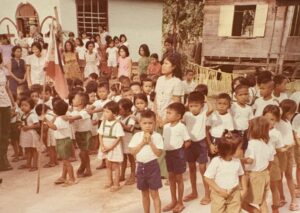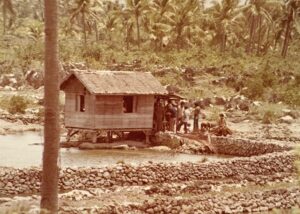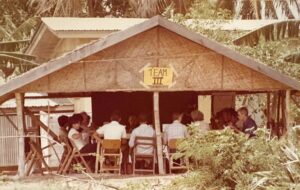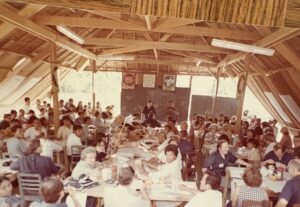




HIGHLIGHTS
AI Notebook LM DIALOGUE about Oyabari and its related INFOGRAPH
The Greenhouse in Oyabari, Terry Bergdall 2025
BACKGROUND
NAME ORIGIN: The name Oyubari means “big mineral” and holds the promise 48 years ago that Oyubari would long prosper as a mining community.
GEOGRAPHY: One-half hour by car from the center of Yubari City in a valley at the foot of Mt. Yubari, is the town of Oyubari. The town begins in the south near the irrigation and hydro-electric dam, and runs north through the valley to an abandoned mine at the end of the road. The western boundary is formed at the base of densely wooded hills; the eastern boundary follows the meandering course of the Shuparo River.
POPULATION: In 1977 Oyabari’s population of 2,700 had basic urban services: electricity, water, sanitation facilities, telephone, medical dispensary and regular bus service to Sapporo, a full complement of education facilities, a bank, a library, three bath houses, city police and fire protection services. The high elevation and Siberian winds bring heavy snowfall and severe cold from September to May. Snow removal from rooftops and private parkways is a daily three to four-hour task for most residents.
CHALLENGES: Overhead steam-heating pipes to Mitsubishi buildings and three daily sirens to signal shift changes at the Nambu mine were constant reminders that Oyubari had been a company town. With the mine-closings during the past 10 years and the subsequent drop in population, the community had some vacated houses and stores, half-filled schools and apartment buildings, boarded-up public buildings and random patches of open land dotted with stacks of weatherbeaten wood. The overall effect was that of a half-deserted ghost town. With further mine-closings imminent, the elders, 500 children, the remaining 300 miners, and those engaged in service occupations were deeply concerned about the future of Oyubari. Most residents wished to stay. A Community Development Committee, the introduction of wood-products industries, and the small-scale beginnings of a tourist trade indicated the decision of the people to recreate Oyubari’s reason for being and to rebuild its future. The Oyubari Human Development Project became a corporate effort in both social and economic development: recovering the economic base through new industrial employment; extending agriculture and tourism ventures; recreating social patterns in services, social and educational activities; and reconstructing physical space.
HISTORY: Oyubari’s history has been dominated by the Mitsubishi Coal Mining Corporation which first settled the town. The company mined its millionth ton of coal during the boom years following World War II, when the population grew to 13,000. Four years before Oyabari launched as a human development project, the closing of the mines occasioned an exodus of 4,000 people from Oyubari in two months.
ACCOMPLISHMENTS
By 1980 the people of Oyubari celebrated the following accomplishments:
- Buildings constructed included an apartment building, a junior high school building and a large gymnasium. The old railroad station was transformed by voluntary labor into a community center.
- Over 200 residents from Oyubari and 200 from outside the village participated in 23 training events. 5 residents visited Indonesia, Hong Kong, Korea, Taiwan, Philippines and the United States.
- About 700 people have visited Oyubari from Norway, Sweden, Finland, Spain, Poland, France, Ireland, Italy, Canada, U.S.A, Costa Rica, Bolivia, Brazil, China, S. Africa, Indonesia, Philippines, Taiwan, Vietnam, Korea and India.
- A vinyl hothouse constructed by 5 farmers pooling resources extended the melon season and doubled its production.
- The businessmen’s association guaranteed $3,000 for a feasibility study and research on the development of a skiing resort.
- Two new festivals, the Logging Festival and the Snow Festival, have become annual events.
- A local newspaper, the Oyubari Voice, has been published every month since July 1977.
DOCUMENTS
- Oyubari Consult 4 Year Plan, June 1977 (for printing). In Japanese (for printing).
“When the leaves fall, the winter sets in. The start of snow fall and six months of snow-bound life that follows signifies our spiritual and physical training period. Clearing roads and rooftops, going to work and shopping in heavy snow falls – such is our destiny: lives of difficulty, endurance and training, waiting for the spring to come. Oyubari, with its wonderful environment, very distinct four seasons, and proud characteristics. Oyubari with its abundant natural beauty. Oyubari will be and we will all strive to make it the paradise of the 1980’s, harmonizing people with nature.”
~~ Community Businessman
